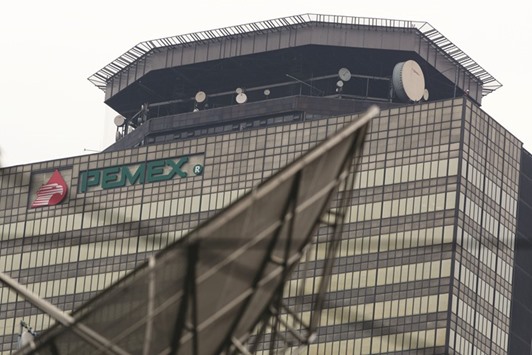The new CEO installed on Monday at the head of Mexico’s state-owned oil company may help smooth the way for an additional cash injection from the government to help the producer cope with a prolonged crash in crude markets.
Jose Antonio Gonzalez Anaya was named to succeed Emilio Lozoya as chief executive officer of Petroleos Mexicanos. Lozoya has been in the middle of a crisis since the finance ministry asked the company known as Pemex to make deeper cost cuts and speed up its search for partners to share the expense of developing the country’s oilfields.
“The new CEO has as a priority the efficiency and profitability of all the processes of Pemex, putting emphasis on the company’s international competitiveness,” President Enrique Pena Nieto said at a news briefing in Mexico City.
That’s a tall order for Pemex, which has seen its profit margin fall to the lowest level in seven years as costs rose and oil prices plunged 70% from 2014 highs.
Gonzalez comes to the job with a background in finance and economics and experience in the Finance Ministry, which might help him work more closely with the government in accomplishing the desired changes, said Duncan Wood, director of the Mexico Institute at the Woodrow Wilson International Center for Scholars in Washington.
His appointment may be “a sign that the government wants someone who will push on with the reforms,” said Wood. “There was a sense of exhaustion setting in under Lozoya.”
Pemex needs to “accelerate the implementation of the energy reform in a very difficult environment,” Gonzalez said on Monday in an interview with El Financiero-Bloomberg TV. He pledged to work closely with the Finance Ministry to cut costs and maximize profits.
Not that it will be any easier for the new CEO. Pemex’s need for more cash from the government to help it weather the downturn hinges on its ability to make the additional cuts.
The request that Pemex trim costs at a time of mounting debt and sunken crude prices is “like asking a starving person to eat less,” according to David Enriquez, a Mexico-city based partner at energy consultant Goodrich Riquelme & Asociados. Pemex has reported 12-straight quarterly losses, including a record $10.2bn loss in the third quarter, and is planning further job cuts as its debt is set to rise above $100bn this year.
Pemex press officials and its investor relations department didn’t respond to calls and messages seeking comment.
Pemex’s profitability has deteriorated faster than most of its 119 peers over the last four quarters, according to data compiled by Bloomberg. It cut capital spending by 18% last year, but that compared with an industry average of 32%, according to a February 2 report from the company.
“The idea of the government granting conditional capital to Pemex as a reward for reducing costs would provide short-term life support for a dying company,” Enriquez said in an interview last week at his Mexico City office. “It will require dozens ofbns of dollars from the government to provide Pemex with ample capital.”
Pemex’s cost of sales was 74% of total revenue in the third quarter, its highest level since the fourth quarter of 2008, according to Bloomberg data. The state-owned company, which has seen production decline for 11 straight years, had its credit-rating downgraded one level by Moody’s Investors Service on November 24 to Baa1, the third-lowest investment grade.
“It will be necessary for Pemex to adjust its cost structure, to review its expense program, and to strengthen its investment processes using the new models of partnerships and alliances with the private sector,” said Pena Nieto on Monday.
Adjustments to Pemex’s spending plan for the year are expected to be announced in the upcoming days, Finance Minister Luis Videgaray said Monday in an interview with Radio Formula.
Mexico’s 2014 plan to end Pemex’s production monopoly included having the company seek partners for joint ventures, to develop fields where oil production has declined. First expected to be announced last year, Pemex now expects to enter the partnerships this year as “the entire proposal is being re-designed,” Treasurer Rodolfo Campos said in a December 23 interview. The company has said partnerships could generate as much as $33bn in new investment.
Pemex is also considering the sale of assets and will eliminate more jobs this year to lower costs and generate additional cash, Campos said. Pemex, which had more than 150,000 employees last year, could cut as many as 10,000 jobs this year, or around 6% of its workforce, according to Isaac Gamboa, a finance ministry official.
While those measures would provide some temporary financial relief, lightening Pemex’s government tax burden would allow the company breathing room to improve operations and limit continued losses, according to Wood, the Mexico Institute director. Levies on Pemex, which fund about a third of federal spending, accounted for 118% of operating income and 129% of before-tax profits from 2009-2014, according to a company presentation.

A signage for Petroleos Mexicanos is displayed on the company’s headquarters building in Mexico City. Pemex’s profitability has deteriorated faster than most of its 119 peers over the last four quarters, according to data compiled by Bloomberg.
